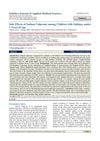 1 citations,
December 2011
1 citations,
December 2011 Marine-derived ingredients show potential for hair health but need more human trials to confirm effectiveness.
 1 citations,
November 2011 in “Dermatologica Sinica”
1 citations,
November 2011 in “Dermatologica Sinica” Women using hair relaxers with alopecia had lower zinc levels, suggesting zinc deficiency might contribute to hair loss.
 1 citations,
January 2009 in “Elsevier eBooks”
1 citations,
January 2009 in “Elsevier eBooks” Combining proper shaving, topical treatments, and laser therapy effectively reduces Pseudofolliculitis Barbae.
 1 citations,
August 1988 in “Journal of The American Academy of Dermatology”
1 citations,
August 1988 in “Journal of The American Academy of Dermatology” Hair transplantation between identical twins can successfully treat severe, nonprogressive hair loss due to follicular aplasia.
 1 citations,
March 1954 in “Archives of dermatology”
1 citations,
March 1954 in “Archives of dermatology” Animal research has greatly advanced dermatology.

Mesenchymal stem cell-derived exosomes significantly increase hair density and thickness in androgenic alopecia patients.

Photobiomodulation improves the quality of life for people with hair loss.
 July 2024 in “Forum Dermatologicum”
July 2024 in “Forum Dermatologicum” Topical treatments for hair loss can be effective but need careful safety evaluation.
 May 2024 in “Research Square (Research Square)”
May 2024 in “Research Square (Research Square)” Many women in Northern Ghana use plant-based cosmetics like shea butter, and their use is more related to being married than to their job, education, or house.

Gender-specific analysis could improve treatment for childhood systemic lupus erythematosus.
 April 2024 in “Medical & clinical research”
April 2024 in “Medical & clinical research” More research is needed to find the best long-term treatments for Alopecia Areata.
 April 2024 in “Journal of cancer research and clinical oncology”
April 2024 in “Journal of cancer research and clinical oncology” Tissue-derived extracellular vesicles are crucial for cancer diagnosis, prognosis, and treatment.
 March 2024 in “Medical lasers”
March 2024 in “Medical lasers” Multiple-wavelength radiation helps hair grow by boosting early hair follicle development.
 March 2024 in “medRxiv (Cold Spring Harbor Laboratory)”
March 2024 in “medRxiv (Cold Spring Harbor Laboratory)” Recent selection on immune response genes was identified across seven ethnicities.
 March 2024 in “Jordan Journal of Biological Sciences”
March 2024 in “Jordan Journal of Biological Sciences” The Pamona community uses 21 types of mushrooms for food, medicine, and other needs, highlighting the importance of conserving these resources.
 December 2023 in “International journal of statistics and probability”
December 2023 in “International journal of statistics and probability” Blood type affects COVID-19 infection rates differently in Europe and Africa.
 December 2023 in “Biological & pharmaceutical bulletin”
December 2023 in “Biological & pharmaceutical bulletin” IPM enhances skin penetration of hydrophilic drugs.
 December 2023 in “Medical & Clinical Case Reports Journal”
December 2023 in “Medical & Clinical Case Reports Journal” Ayurvedic treatment, including leech therapy, can effectively regrow hair in alopecia areata.
 November 2023 in “Frontiers in pharmacology”
November 2023 in “Frontiers in pharmacology” Drug repositioning offers hope for new, affordable treatments for a genetic skin disorder called ARCI.
 November 2023 in “Linköping University medical dissertations”
November 2023 in “Linköping University medical dissertations” Keratinocytes and adipose-derived stem cells can effectively heal difficult skin wounds.
 September 2023 in “Journal of the turkish academy of dermatology”
September 2023 in “Journal of the turkish academy of dermatology” Men with male pattern baldness had higher body fat and obesity-related measurements but similar heart fat and artery thickness compared to healthy men.
 July 2023 in “Journal of lasers in medical sciences”
July 2023 in “Journal of lasers in medical sciences” Red laser therapy helped regrow hair in an alopecia areata patient within 21 days.
 June 2023 in “International journal of biology, pharmacy and allied sciences”
June 2023 in “International journal of biology, pharmacy and allied sciences” New medications are improving depression treatment, emphasizing accurate diagnosis and chronic care.
 April 2023 in “Medizinische Genetik”
April 2023 in “Medizinische Genetik” New research has found 14 genes linked to the risk of developing alopecia areata, improving understanding and treatment options.

Lifestyle changes can improve skin health and reduce disease symptoms.

Social media data can help track and predict COVID-19 symptoms and trends.
 December 2021 in “Benha Journal of Applied Sciences”
December 2021 in “Benha Journal of Applied Sciences” Higher Claudin 3 levels in the blood are linked to more severe alopecia areata.
 September 2021 in “Selçuk Üniversitesi Tıp Fakültesi dergisi”
September 2021 in “Selçuk Üniversitesi Tıp Fakültesi dergisi” People with chronic Hepatitis C often have skin problems like itching and contact dermatitis, especially older individuals and women.
 January 2021 in “Erciyes medical journal”
January 2021 in “Erciyes medical journal” The COVID-19 pandemic changed the types of skin conditions seen at a clinic, with fewer patients and varying numbers of specific conditions.
 July 2020 in “Scholars journal of applied medical sciences”
July 2020 in “Scholars journal of applied medical sciences” Sodium valproate caused vomiting, hair loss, loss of appetite, abdominal pain, weight gain, and anemia in young children with epilepsy.






























